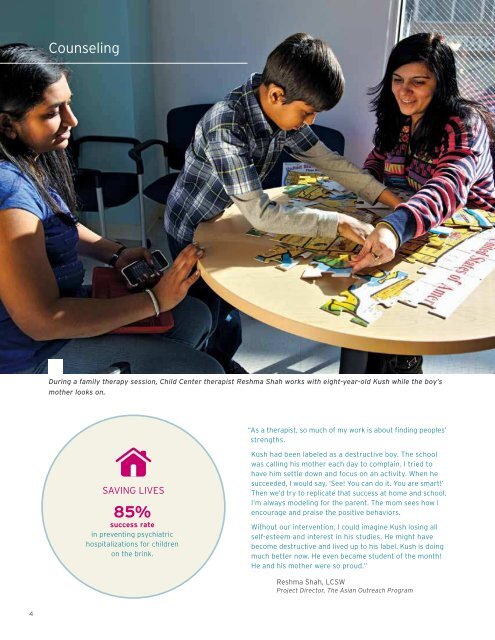Annual Report 2012 - The Child Center of NY
Annual Report 2012 - The Child Center of NY
Annual Report 2012 - The Child Center of NY
You also want an ePaper? Increase the reach of your titles
YUMPU automatically turns print PDFs into web optimized ePapers that Google loves.
4<br />
Counseling <strong>Child</strong> Abuse Prevention<br />
During a family therapy session, <strong>Child</strong> <strong>Center</strong> therapist Reshma Shah works with eight-year-old Kush while the boy’s<br />
mother looks on.<br />
sAVING LIVes<br />
85%<br />
success rate<br />
in preventing psychiatric<br />
hospitalizations for children<br />
on the brink.<br />
“ As a therapist, so much <strong>of</strong> my work is about finding peoples’<br />
strengths.<br />
kush had been labeled as a destructive boy. <strong>The</strong> school<br />
was calling his mother each day to complain. I tried to<br />
have him settle down and focus on an activity. When he<br />
succeeded, I would say, ‘see! You can do it. You are smart!’<br />
<strong>The</strong>n we’d try to replicate that success at home and school.<br />
I’m always modeling for the parent. <strong>The</strong> mom sees how I<br />
encourage and praise the positive behaviors.<br />
Without our intervention, I could imagine kush losing all<br />
self-esteem and interest in his studies. He might have<br />
become destructive and lived up to his label. kush is doing<br />
much better now. He even became student <strong>of</strong> the month!<br />
He and his mother were so proud.”<br />
Reshma shah, LCsW<br />
Project Director, <strong>The</strong> Asian Outreach Program<br />
ResTORING A FuTuRe<br />
86%<br />
less crime,<br />
drug use, truancy, and other<br />
risk behaviors among kids in our<br />
Juvenile Justice Program.<br />
“ I believe that anyone can change with the right supportive<br />
environment. That’s why child abuse prevention is a good<br />
fit for me.<br />
Most <strong>of</strong> the parents we see don’t mean to abuse or neglect<br />
their children. <strong>The</strong>y love their children. But we usually find<br />
that they are carrying deep baggage from their own childhood<br />
trauma and they are not aware that they are passing<br />
it on. We provide the parents with a supportive environment<br />
so they can help themselves first. <strong>The</strong>n they can<br />
have a healthy relationship with their children.<br />
I always wanted to help other people—I was just born<br />
this way. My team is the same. We don’t do this work for<br />
money. We do it because we want to. We really care about<br />
the community.”<br />
zoe Liang, LCsW<br />
Project Director, Prevention Program<br />
Hank Auffarth Family <strong>Center</strong><br />
5 1953–2013 60 YeARs


